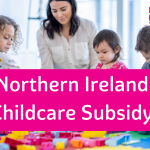What does the Chancellor’s 2025 Spring Statement mean for families?
Chancellor Rachel Reeves makes key announcements in her Spring Statement continuing the government’s ‘Plan for Change’ to put public finances on a sustainable path while supporting investment in public services and growth.
In her first Spring Statement on 26 March 2025 Chancellor Rachel Reeves stated that the government is focused on securing Britain’s future through its Plan for Change – driving economic growth, building an NHS fit for the future and keeping the country safe. Since the Chancellor came into office there has been a reduction in the rate of inflation, however the Office for Budget Responsibility (OBR) is predicting a some volatility with a peak in summer of 3.8% and then fall close to the 2% target in the second quarter of 2026.
This is welcome for households and families who are seeing some easing of the cost of living pressures through falls in interest rates and a rise in the National Living and Minimum Wage. However, since autumn, the world has changed. Europe is now facing a generational challenge to its collective security. Global economic uncertainty has increased sharply with slower growth and higher borrowing costs in many other countries, the UK economy is not immune to the effects of these challenges.
Key points from Spring Statement 2025
Here are some of the key points from the Spring Statement at a glance:
- Increased spending on defence: increasing defence spending to 2.5% of GDP by 2027, including by providing an additional £2.2 billion of funding for the Ministry of Defence next year.
- Reforming public services: to ensure welfare spending is targeted towards those that need it the most and the tax that is owed is paid.
- Supporting growth: investing in capital infrastructure over the next five years, train up to 60,000 more skilled construction workers, and investing an in social and affordable housing.
Read the full detail on the Spring Statement on the Government’s website here.
Previously announced:
- National Living and Minimum Wage increasing by at least 6.7% depending on age,
- Employer National Insurance Contributions increasing from 13.8% to 15%
- State Pension increasing by 4.1%
- Universal Credit and other working age benefits increase by 1.7%
There will be no change in the rates of income tax and a continued freeze in the tax-free personal allowance and the thresholds at which earners start to pay basic and higher rates of income tax until April 2028. This means that more people will be paying tax, and more will be paying tax at a higher rate.
Note: However, the announcement on income tax changes applies in England, Wales and Northern Ireland only. Scotland has different taxation rules to the rest of the UK. The Scottish government set out its tax and spending plans for 2025/26 in its Budget Statement on 4 December 2024.
Welfare Changes
One of the most concerning elements of the Spring Statement is the planned changes to support for families through Universal Credit and other aspects of the welfare system which will focus on helping people start or stay in work, while protecting those who cannot work due to ill health. These announcements along with the recent Pathways to Work Green Paper, show a direction of travel which will put more pressure on families claiming benefits and in particular those who have disabilities.
Universal Credit Health Element: Changing the payment levels in Universal Credit, to address perceived incentives in the system, freezing the UC health element for existing claimants until 2029-30. For new claims, the UC health element will be reduced to £50 a week in 2026-27 and then frozen until 2029-30.
Universal Credit Standard Allowance: The government will increase the Universal Credit standard allowance for new and existing claims above inflation from April 2026, the weekly rate for a single person aged 25 and over will increase from £92 in 2025-26 to £106 in 2029-30.
Welfare Fraud and Error: increasing preventative checks in Universal Credit to verify the amount of savings claimants hold, as well as their earnings and expenses.
High Income Child Benefit Charge (HICBC): From summer 2025, employed individuals liable to the HICBC will be able to report their family’s Child Benefit payments through a new digital service and opt to pay HICBC directly through PAYE, without the need to register for Self Assessment.
No change in support for Tax-Free Childcare
The 1.7% uplift announced to Universal Credit also includes an increase in the maximum amount of support that can be claimed for registered childcare costs.
However, there is no increase to the maximum amount of financial support given through Tax-Free Childcare. This remains capped at £2,000 per child, despite the continued rise in childcare costs. Currently Tax-Free Childcare pays 20% of registered childcare costs up to a maximum of £2,000 per year, per child, Employers For Childcare, other parents’ groups and politicians in Northern Ireland have been calling for an increase in both the percentage of childcare costs supported and the removal of the £2,000 cap, to better reflect the increased childcare costs that families are now having to pay.
Northern Ireland
As a result of the Spring Statement announcements, Northern Ireland, through the Barnett Consequential, will receive £14 million for the NI Executive to spend on public services. It is up to the Executive to decide when and how this money will be allocated across the government departments, but we would wish to see a significant portion ring-fenced to support the delivery of short-term financial support for families and the childcare sector, and longer-term investment in childcare infrastructure through the new Early Learning and Childcare Strategy.
We are here to help you
We know it can be difficult to work out what financial support is available for your family and to interpret what changes announced in the Spring Statement mean for you. We want to make sure all families are receiving everything they are entitled to. For free, impartial and confidential advice, call our Family Benefits Advice Service on 028 9267 8200 or email hello@employersforchildcare.org.






